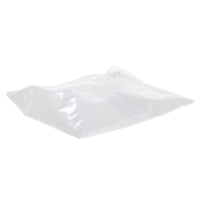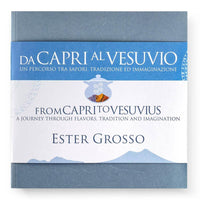Tasting the Volcano - Cantina del Vesuvio’s Truly Unique Terroir
Apr 24, 2021
Tasting the Volcano - Cantina del Vesuvio’s Truly Unique Terroir
From the beautiful vineyards of Cantina del Vesuvio, where the characterful and expressive grapes reach ripeness beneath the Mediterranean sunshine, it’s impossible to not feel a profound connection with the land. Here, vines have been cultivated for millennia - the Romans knew the value of these soils, just as the Etruscans did before them - and they continue to inspire the winemakers who call this stunning part of the world home.
Cantina del Vesuvio’s relationship with their volcanic namesake runs deep into the winery’s identity. The looming geology of Mount Vesuvius sits majestically against the skyline, and its history-shaping eruptions have altered the landscape surrounding it forevermore.
One might think that farming and practising viticulture in the shadow of such an infamous volcano would come with inherent danger. However, one only has to look at other comparable locations across Italy - and indeed, across the rest of the world - to see that even in the environs of active volcanoes such as Etna and Stromboli, those who work the land return time after time to reap the riches of the volcanic soils that they provide.
In this week’s article, we’re going to be taking a closer look at the impact that soil type - and especially volcanic soils - have on viticulture and the resulting wines. It’s a subject which takes us to the very heart of the concept of terroir, a veritable buzzword in the contemporary wine scene, and which will allow us to gain a deeper understanding of what makes Cantina del Vesuvio so very special.
Understanding Terroir
If you’ve been keeping your ear to the ground of the international fine wine scene of the past decade, then you’re most likely already familiar with the notion of terroir. It’s a notoriously difficult word to translate from the original French; the word itself is a derivation of terre, or land, and refers to an elusive concept which hints at the special relationship winemakers have with their precious vineyards.
Essentially, terroir refers to the sense of time and place that great wine communicates in the bottle and the glass. There are so many different factors which make every vineyard unique, and all of them lend something to the specific terroir of the wine. Speak to any grape grow or vigneron, and they’ll doubtlessly wax lyrical about the microclimate of their plot, the elevation of the land, the local water sources, and most importantly, the precise mineral and geological composition of their soils.
Do all of these factors really influence the resulting taste of the wine we drink? The scientific community aren’t entirely sure about the matter, and yet it has become the single most important factor for thousands of wineries across the globe, and a powerful dynamising force behind recent trends for minimal-intervention, organic, biodynamic, and natural winemaking practices (all of which strongly believe that by reducing intervention and processing, the nature of their terroir manifests more potently).
Of course, we see evidence of terroir’s influence in all kinds of products aside from wine, which strongly suggest the reality of its impact on flavour, aroma, and character. Take the humble tomato, for example. We all know, and have all experienced, how a tomato grown in fertile soils in optimal climatic conditions tastes, looks, and smells completely different to those grown in industrial greenhouses. As such, why would the same concept not apply to grapes?
An Expression of Time and Place
There’s a romance to the notion that a wine reflects the land on which it’s grown, but there’s also powerful evidence and a whole lot of history to support it.
Grapes grow quite happily in a range of climatic conditions, and in a number of different soil types. At the height of the Roman empire, Roman oenologists were planting vineyards everywhere from the arid hillscapes of North Africa to the wind-blasted shores of Southern Scotland, exploring the potential for different grape varietals and establishing the wine cultures of France, Austria, Germany, Spain, and much of the Middle East along the way. However, even in those earliest years of European winemaking, it quickly became clear that certain locations were simply better for grape growing, and resulted in tastier, more complex, and altogether more interesting and enjoyable wines.
Many of those wine regions remain world-beating locations to this day, and aspects of terroir such as climate only ever told part of the story. The secret to the finest points of a wine’s identity have always been associated with the soil - and when it comes to the finest wines, very fertile soils (which may be perfect for tomatoes and other fruits) are rarely those which lead to the most remarkable bottles.
Make no mistake, grapes will grow to full ripeness in such soils, and will hang in heavy bunches from the copious vines which will spring up quickly each year. However, quality wine which encapsulates that perfect balance of acidity and sweetness, and which captures all of those subtle and expressive notes, needs to come from grapes which have struggled somewhat. Slow-ripening, low-yielding grapes will carry more of the mineral complexity of the soil, and will have a sharper acidity and stronger tannic character - all of which are perfect for ensuring a fantastic flavour and brightness after maturation.
The Eternal Influence of Vesuvius
Let’s return our attention to Cantina del Vesuvio, and to the soils which typify the vineyards and land surrounding the foothills of Vesuvius. You don’t need to be a geologist or volcanologist to recognise that volcanic soils - such as those found at the vineyards of the Cantina - have a quality entirely of their own, almost incomparable to many other soil types.

These soils have been influenced by the most elemental powers of the Earth, and feature complex mineral deposits brought to the surface via the most spectacular eruptions and seismic activity. The texture of the soil, too, is completely different from the clay, gravel, and loam-based soils found in many of the world’s leading wine regions; volcanic soil tends to be spongier, more aerated, and capable of holding and retaining considerable amounts of water.
Volcanic soils are treasured by winemakers lucky enough to work in such regions, because they allow for the optimal balance of fertility and expression in the fruit. Unlike in many highly fertile soil types (which, as we mentioned, often lead to flabby and flavourless or overly sweet and juicy grapes), volcanic soils tend to result in well-balanced fruit, which can be harvested at the perfect moment for maximum flavour and aroma.
This comes down in no small part to the porous quality of volcanic soil. Just as volcanic pumice stone is light, airy, and porous, volcanic soils have a similar composition which allows for excellent drainage and a high retention of mineral compounds. Furthermore, volcanic soil lightness relative looseness prompts the vines to send their roots deeper underground for greater stability, exposing them to higher levels of nutrition along the way.
Mineral Flavours and Volcanic Wines
When considering the influence of volcanic soils on vines, we must ask ourselves - how does all of this affect the fruit, and more importantly, the wine which follows? Many fans of volcanic wines will claim that much of the mineral character of the soil is detectable on the palate when the wine is drunk.
Indeed, ‘minerally’ has become another key buzzword in recent years, and generally refers to a flinty, smoky, or steely flavour note present in many wines from specific terroirs, most notably the Alpine regions of Italy, and the volcanic regions of the south. As is so often the case with fine wine descriptions, the veracity of these claims is open to debate and is ultimately somewhat subjective. However, as we’ve already mentioned, there’s no doubt about the fact that the influence of terroir can be felt on the tongue… often in ways which are quite difficult to understand or put accurately into words.
Cantina del Vesuvio - Capturing the Majesty of Italy’s Volcanic Soils
Anyone who has enjoyed the beautifully expressive and characterful wines of Cantina del Vesuvio will understand, almost instinctively, the relation between the wine and the landscape from which it comes. In each glass, there is a suggestion of the sunlight, of the topography, and of the unique relationship between the winemakers, their grapes, and the shadow of that dormant volcano.
Such blissful drinking experiences are the result of a whole number of different factors, ranging from a passion for winemaking, an ancestral history and understanding of grape growing, a dedication to excellence, and - yes, of course - those unique and wonderful soils.
The vintners at Cantina del Vesuvio know how much they owe to the mountain and to the soil which resulted from the volcanic activity within, just as they know what they owe the Italian sunshine and their own heritage of wine production. Winemaking is and always has been a process which is as simple as it is complex; all of these factors together harmonise, weaving their way into each bottle in a rich tapestry of flavour, aroma, character, and distinction.




